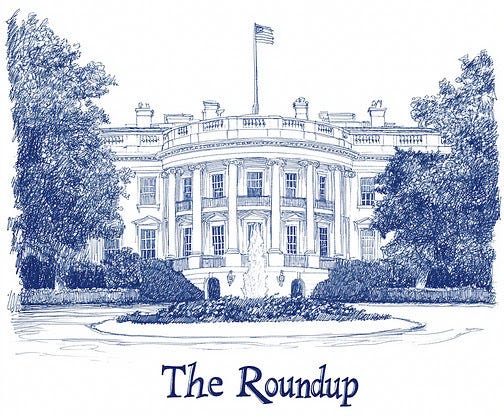Please click here to opt in to receive the Executive Functions Roundup via email and to subscribe to Executive Functions.
A three-judge panel of the Ninth Circuit Court of Appeals on Friday upheld a temporary restraining order (TRO) enjoining the government from “conducting detentive stops” relying solely only on how people look, how they speak, where they are located, or the type of work they do because sole reliance on those factors does not constitute the “reasonable suspicion” required by the Fourth Amendment. The panel stayed a clause of the TRO prohibiting sole reliance on the four factors to form reasonable suspicion “except as permitted by law” as impermissibly vague. See a prior Roundup for the original TRO. (Order.) (NYT.)
Under section 705 of the Administrative Procedure Act, Judge Jia Cobb (D.D.C) on Friday stayed, until the conclusion of the litigation, expedited removals “as to all noncitizens who have been, at any point in time, paroled into the United States at a port of entry.” (Order.) (Opinion.) (NYT.)
Pursuant to section 705 of the Administrative Procedure Act, Judge Trina Thompson (N.D. Cal.), on Friday ordered that the government’s terminations of Temporary Protected Status (TPS) for Nepal, Honduras, and Nicaragua be “postponed to preserve the status quo and until hearing on the merits.” (Order.) (NYT.)
A three-judge panel of the Ninth Circuit Court of Appeals on Friday granted an emergency stay of the district court’s preliminary injunction of Executive Order 14251, “which excludes certain federal agencies and subdivisions from collective bargaining requirements based on national security concerns.” (Order.) (Executive Order.) (NYT.)
The en banc U.S. Court of Appeals for the Federal Circuit heard oral argument on a pair of lawsuits challenging tariffs imposed by President Trump under the International Emergency Economic Powers Act (IEEPA). See prior Roundups for the procedural history of the case. (Politico.)
At the request of Senator Tom Cotton (R., Ark.) The Office of Special Counsel opened an investigation into Jack Smith, the former Justice Department special counsel who investigated President Trump before he returned to office, for a possible violation of the Hatch Act. (WAPO.)
The federal government is freezing $339 million in research funding for the University of California, Los Angeles (UCLA). (NYT.)
Senator Tim Kaine (D., Va.) filed resolutions under the Foreign Assistance Act of 1961 to compel the State Department to answer questions about human rights conditions in six third countries to which it deported migrants. The resolutions can’t be filibustered and require only a simple majority to pass the Senate. (WAPO.)
The White House Office of Management and Budget is blocking funding for various public health programs run by the Centers for Disease Control and Prevention (CDC). (WSJ.)
Bob Bauer and Jack Goldsmith discussed how the White House and the DOJ are managing the Epstein scandal and how Congress should be thinking about it. (Executive Functions.)
Aaron S.J. Zelinsky and David Reiser wrote about the legal issues raised by the New Jersey United States Attorney controversy and argued that there are potentially significant problems with Alina Habba’s appointment as U.S. Attorney. For background on the controversy see prior Roundups and a video conversation between Jack Goldsmith and Anne Joseph O’Connell. (Lawfare.)
Professor Jonathan Adler responded to Professor Steve Vladeck’s reply to his recent essay. Professor Adler had suggested Professor Vladeck “wrongly characterized the Supreme Court’s principled formalist jurisprudence for appeasement of the Trump Administration.” (Volokh Conspiracy.)
Pending Interim Order Applications Involving the U.S. Government in the Supreme Court
National Institutes of Health, et al. v. American Public Health Association, et al.: Government filed application on July 24 to stay district court order that prevented the National Institutes of Health from canceling grants that, according to the administration, are related to DEI and “gender ideology.” APHA respondents filed response in opposition to government’s application for a stay. Government filed reply in support of application for a stay.






